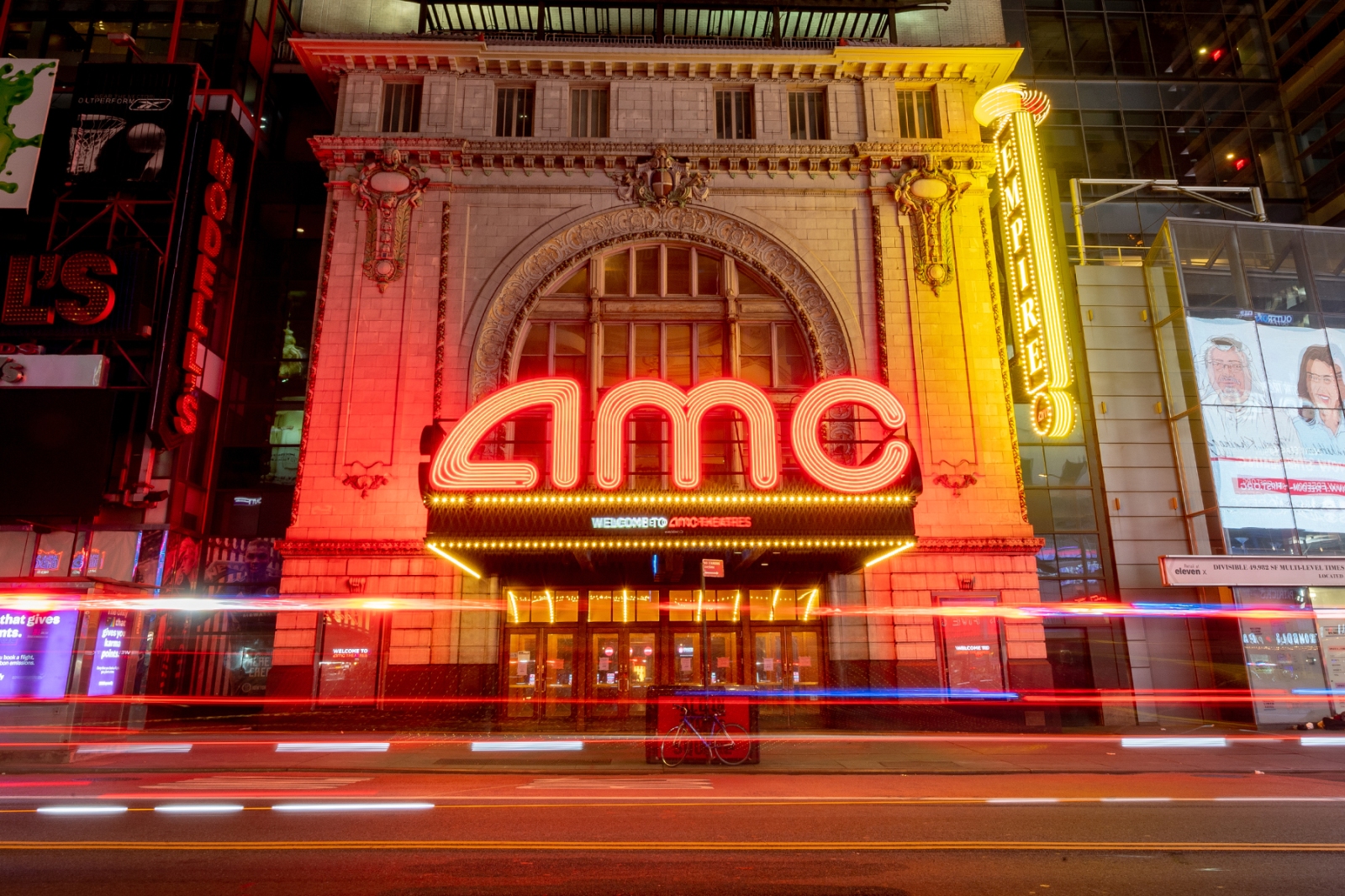‘Sound of Freedom’ Fans and AMC Investors Wage War of Conspiracy Theories

Somehow, market manipulation feels good in a place like this.
So might Nicole Kidman say in her iconic advertisement for AMC Theatres — if it had been scripted by the cinema chain’s hardcore investors, that is. Ever since an internet mob rescued the company from the brink of bankruptcy in 2021 by snatching up shares in a coordinated buying frenzy, this group has grown entrenched, defensive and somewhat paranoid that large Wall Street firms are illegally colluding to crash the stock. But this week, their niche financial conspiracy theories ran up against the far-right misinformation machine that drives much of our ongoing culture war, making for a bizarre clash of competing, social media-fueled falsehoods.
To refresh your memory: At the turn of 2021, as AMC Entertainment Holdings threatened to collapse following a year of Covid-19 lockdowns, Reddit users of r/wallstreetbets and other small-time traders pulled off an epic “short squeeze.” As with the struggling video game store GameStop, they rallied together to push AMC’s stock price sky-high, forcing hedge funds that had shorted it (i.e., bet against the company) to close out their positions at a loss. Collectively, the AMC “apes,” as these meme stock boosters called themselves, became a major stakeholder. Apes have held fast to the hope that their AMC shares will pay enormous dividends down the line, while warning that the investment firms they pranked will do anything to ruin them. Such concerns are not without merit — funds have continued to short AMC — but some investors have slipped into outright delusional thinking.
A new wrinkle in that saga was the July 4 release of the controversial Jim Caviezel drama Sound of Freedom, which has drawn criticism for distorting the reality of human trafficking to suit right-wing narratives (including QAnon myths about a shadowy cabal of pedophile elites). Conservatives flocked to the film, which benefited enormously by being shown in AMC theaters nationwide. But these viewers soon kicked off a wave of conspiracy theories about the company, alleging that they secretly want to tank the film. Attendees who noticed technical issues at their AMC showings began chalking them up to a nefarious plot to keep them from seeing a politically important exposé.
One TikTok user in North Carolina posted a video that has now been viewed over 10 million times, accusing AMC of “pulling some sketchy crap” for refunding her ticket because the theater’s air conditioning was broken, implying that they meant to drive audiences away. “There was air conditioning in the hallways, there was air conditioning in the bathrooms. Not in the theaters?” she said. “I smell something stinky, and I think it’s shit.” In another TikTok, viewed 5 million times, a couple alleges that not only was the AC out at their AMC theater showing of Sound of Freedom, but the theater lights were left on for the entire presentation. “They don’t want you to see this movie,” the user says. A third viral TikTok purports to show an audience that had been evacuated for an unspecified emergency. The comment sections on each clip are packed with reports of the same or similar problems, including reels that cut out and sound lowered to inaudible volume.
Along with these complaints came calls to boycott AMC, or give it the “Bud Light treatment,” as when conservatives declared war on the beer brand over their endorsement deal with trans entertainer Dylan Mulvaney. The AMC apes — an investor class as rabidly online as the conspiracist right — took notice of these rumblings, and began spinning up their own outlandish counter-theories. In the TikTok complaints, they saw a coordinated attempt to drive down AMC stock and hurt their investment. One self-styled market analyst, for example, suggested that the TikTok users could have been “manipulated” into making such content, or else were clout-chasing “opportunists” taking “assignments” from other parties. Some accused media outlets that aggregated the videos of “trying to spread fake FUD,” a marketing acronym for “fear, uncertainty and doubt,” and helping short sellers to “instigate a boycott.”
AMC CEO Adam Aron — who is active on Twitter and has a friendly rapport with the apes — himself weighed in on the “bizarre FUD” around the company over the weekend, though he stopped short of declaring it any kind of economic sleight-of-hand by nefarious hedge funds, instead wondering if “bots” or “haters” were responsible. The next day, he quoted an exec at the film’s distributor, Angel Studios, who said no theater brand had done more to support its theatrical run. On Wednesday, Aron once again griped about misinformation pertaining to Sound of Freedom screenings at AMC, claiming that at least a million people had watched it at their venues.
Then, in a wild twist, the apes’ inkling of a financial scheme was apparently confirmed by a joke tweet from a comedian. “I work at AMC and just got fired for refusing to add this liquid to a customer’s soda,” wrote @mrnastynodrama, referring to a photo of a small vial of liquid. “We were instructed specifically to serve this to Sound of Freedom audiences. I am a microbiology student and took it to the lab to examine and found what looks like nanobots inside.” Of course, this claim was not remotely true, and the images were sourced from elsewhere on the internet, as a Community Note confirmed.
For all this supposed subterfuge, neither Sound of Freedom nor AMC has been much dampened in the market: the modestly budgeted film is a certified indie hit, having crossed the $50 million mark at the box office, while the theater empire’s stock is slightly up since the beginning of 2023, along with rising revenues. A reasonable person might conclude that nobody is actually disabling air conditioners to dissuade would-be moviegoers, or writing shitposts about nanobots in fountain sodas so they can win a bet against a multibillion-dollar corporation. Just the same, two different strands of conspiracist DNA have merged and mutated. That they made a fine match goes to show how immersion in any sufficiently extreme online community can slant your perspective toward the absurd.
Or, to paraphrase Nicole Kidman’s AMC ad, even the most implausible stories feel perfect and powerful in these enclaves — because there, they are.
This article has been archived for your research. The original version from Rolling Stone can be found here.


